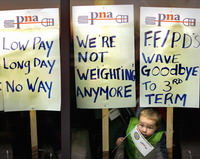Irish nursing union ends protests
A narrow majority of hospital nurses accepted a compromise plan and ended their 8-week-old protests without achieving most of their demands on pay and working hours.

About 54 percent of the 35,000 members of the Irish Nurses Organization voted to accept the plan proposed last week by government-appointed mediators. But 46 percent rejected the plan, which offers a June 2008 cut in work time to 37½ hours but no pay-raise guarantees.
Irish Nurses Organization leader Liam Doran said the substantial "no" vote "demonstrates just how angry many nurses are at their treatment by the government and management."
But he said all members would resume normal duties at 8 a.m. (0700GMT) Thursday, ending the worst labor unrest in Ireland's overloaded medical system since 1999.
Since early April nurses from two unions, including more than 8,000 members of the Psychiatric Nurses Association, have been disrupting hospital functions in pursuit of an immediate pay raise of 10.6 percent and a four-hour cut in their work week to 35 hours.
They have been refusing to do administrative work, such as answering telephones and putting the details of patients' care into computer databases. They also have mounted brief walkouts that have forced more than 2,000 operations and other procedures to be canceled.
The Psychiatric Nurses Association also are voting by mail on the compromise plan. Their decision will not be announced until June 5.
However, the general secretary of that union, Des Kavanagh, suggested that its members would be bound by the Irish Nurses Organization vote. "In event of our rejection, it would not be wise for Psychiatric Nurses Association to take on this battle on our own," he said.
The compromise plan, which hospital managers in the government's Health Service Executive has already accepted, says an expert committee should explore how to meet the nurses' full demands without increasing costs on the system. This would require the nurses to accept new overtime rules, schedules and other work conditions.
The troubles in Ireland's hospitals emerged as the No. 1 issue during Ireland's four-week general election campaign, which was ending Wednesday. Voters elect a new parliament Thursday.
Opposition leaders repeatedly accused the 10-year-old government of Prime Minister Bertie Ahern of squandering money on the development of private hospital services rather than funding enough beds in existing state-funded hospitals. The man trying to replace Ahern as prime minister, Fine Gael party leader Enda Kenny, has promised to solve the problem by funding an extra 2,300 hospital beds in this country of 4.2 million.
The nurses' protests highlighted the other big issue in the modern Republic of Ireland - the onerous cost of living, particularly in the fast-growing capital, Dublin.
Most people find it difficult to afford a home in a city where property prices have quadrupled in a decade. The current inflation rate of 5.1 percent also exceeds the country's national wage-pact agreement that restricts the salaries of a third of all workers, including members of the nursing unions.
Subscribe to Pravda.Ru Telegram channel, Facebook, RSS!


